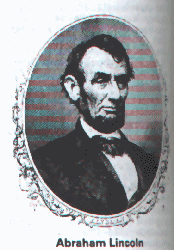
Taken from The Daily Nonpareil‘s “Celebration 150,” written by Gail Holmes
Abraham Lincoln made one visit to southwest Iowa, in 1859, but had or acquired several lasting ties here.
Lincoln’s visit to Council Bluffs was less than fifteen months before he was elected president. His ties to southwest Iowa sprang from his service as captain of the Illinois militia in the Blackhawk War of 1832 and from his personal, if peripheral and presidential involvement in railroads.
Brothers Henry W. and Daniel A. Miller, founders of Miller’s Hollow, later Kanesville/Council Bluffs, served with Lincoln in the Blackhawk War.
E. Orlean Miller Loehle, great-granddaughter of Daniel Arnold Miller, recently wrote a duo-biography entitled The Master Builders, in which she said: “The organizer of the militia was a young man about their same age by the name of Abraham Lincoln. He and Henry and Daniel became good friends. Henry and Lincoln both enjoyed wrestling and often pitted their strengths against each other. They were the same weight, even though Lincoln was about three inches taller.”
Lincoln’s Blackhawk War service also resulted in him claiming 160 acres of land about seven miles northwest of what is now Dennison, in Crawford County. It is listed as Land Warrant 68,465 as a reward for serving as a captain of the Illinois militia during the Sac and Fox skirmish of 1832.
But that wasn’t the only southwest Iowa land in which Lincoln had an interest. On February 1, 1859, he wrote a letter from Springfield, Illinois to then Kansas resident M. W. Delahay that he, Lincoln, intended to visit Council Bluffs sometime during the year.
Lincoln and O. M. Hatch, Illinois Secretary of State, left Springfield on August 9, 1859, for Council Bluffs. Lincoln planned to look over property being offered by Norman B. Judd as security for a $3,000 debt.
While in town, Lincoln found railroad civil engineer, Grenville M. Dodge, relaxing on the porch of the Pacific House. Having been told by Pusey that Dodge had been looking for a practical rail route to the Pacific Ocean, Lincoln skillfully questioned Dodge for two hours.
Years later, Dodge wrote: “This interview was of the greatest importance to me. It was a milestone in my life and Lincoln never forgot it.”
Much later, midway through the Civil War, Lincoln persuaded Congress to fund a transcontinental railroad through Iowa. Dodge purchased 1,000 acres of land in Council Bluffs for the Union Pacific.
Lincoln said if he designated Council Bluffs as the starting point for the Union Pacific Railroad, he would be accused of doing it for personal gain, because of the Judd lots, but he was going to go ahead and do it anyway.
Although Lincoln was killed by an assassin’s bullet, his interview with Dodge on the porch of the Pacific House in Council Bluffs set the stage for the later construction of the first transcontinental railroad across America – through Council Bluffs.
